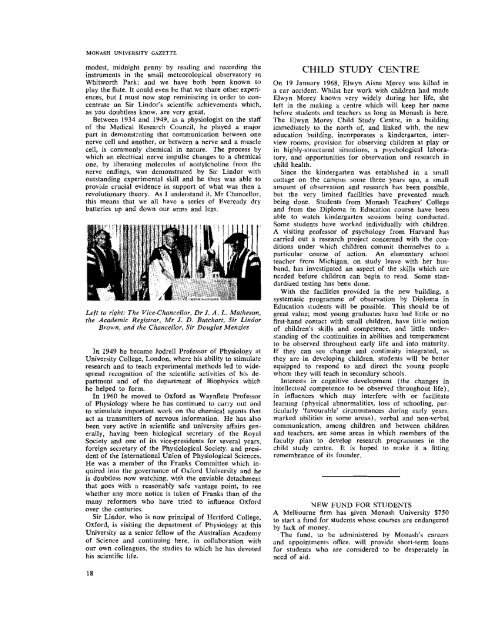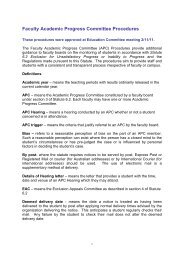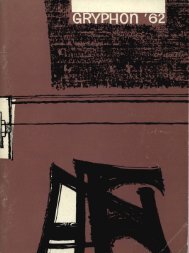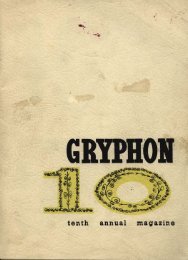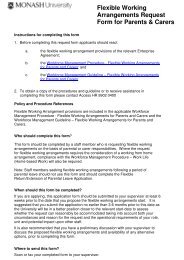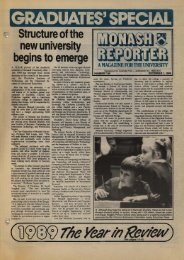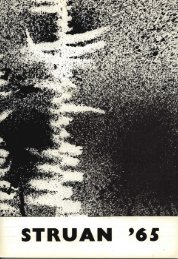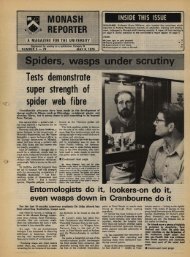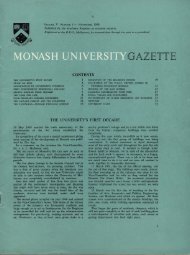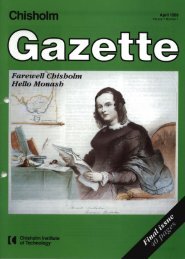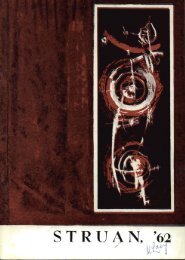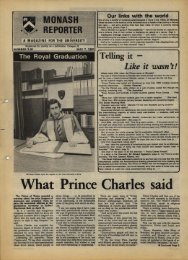MONASH UNIVERSITY GAZETTEmodest, midnight penny by reading and recording theinstruments in the small meteorological observatory inWhitworth Park: and we have both been known toplay the flute. It could even be that we share other experiences,but I must now stop reminiscing in order to concentrateon Sir Linder's scientific achievements which,as you doubtless know, are very great.Between 1934 and 1949, as a physiologist on the staffof the Medical Research Council, he played a majorpart in demonstrating that communication between onenerve cell and another, or between a nerve and a musclecell, is commonly chemical in nature. The process bywhich an electrical nerve impulse changes to a chemicalone, by liberating molecules of acetylcholine from thenerve endings, was demonstrated by Sir Lindor withoutstanding experimental skill and he thus was able toprovide crucial evidence in support of what was then arevolutionary theory. As I understand it, Mr Chancellor,this means that we all have a series of Eveready drybatteries up and down our arms and legs.Left to right: The Vice-Chancellor, Dr J. A. L. Matheson,the Academic Registrar, Mr J. D. Butchart, Sir LinderBrown, and the Chancellor, Sir Doug/as MenziesIn 1949 he became Jodrell Professor of Physiology at<strong>University</strong> College, London. where his ability to stimulateresearch and to teach experimental methods led to widespreadrecognition of the scientific activities of his departmentand of the department of Biophysics whichhe helped to form.In 1960 he moved to Oxford as Waynflete Professorof Physiology where he has continued to carry out andto stimulate important work on the chemical agents thatact as transmitters of nervous information. He has alsobeen very active in scientific and university affairs generally,having been biological secretary of the RoyalSociety and one of its vice-presidents for several years,foreign secretary of the Physiological Society. and presidentof the lnternational Union of Physiological Sciences.He was a member of the Franks Committee which inquiredinto the governance of Oxford <strong>University</strong> and heis doubtless now watching, with the enviable detachmentthat goes with a reasonably safe vantage point, to seewhether any more notice is taken of Franks than of themany reformers who have tried to influence Oxfordover the centuries.Sir Linder, who is now principal of Hertford College,Oxford, is visiting the department of Physiology at this<strong>University</strong> as a senior fellow of the Australian Academyof Science and continuing here, in collaboration withour own colleagues, the studie s to which he has devotedhis scientific life.CHILD STUDY CENTREOn 19 January 1968, Elwyn Aisne Morey was killed ina car accident. Whilst her work with children had madeElwyn Morey known very widely during her life, sheleft in the making a centre which will keep her namebefore students and teachers as long as <strong>Monash</strong> is here.The Elwyn Morey Child Study Centre, in a buildingimmediately to the north of, and linked with, the new<strong>edu</strong>cation building, incorporates a kindergarten, interviewrooms, provision for observing children at play orin highly-structured situations, a psychological laboratory,and opportunities for observation and research inchild health.Since the kindergarten was established in a smallcottage on the campus some three years ago, a smallamount of observation and research has been possible,but the very limited facilities have prevented muchbeing done. Students from <strong>Monash</strong> Teachers' Collegeand from the Diploma in Education course have beenable to watch kindergarten sessions being conducted.Some students have worked individually with children.A visiting professor of psychology from Harvard hascarried out a research project concerned with the conditionsunder which children commit themselves to aparticular course of action. An elementary schoolteacher from Michigan, on study leave with her husband,has investigated an aspect of the skills which areneeded before children can begin to read. Some standardizedtesting has been done.With the facilities provided in the new building, asystematic programme of observation by Diploma inEducation students will be possible. This should be ofgreat value; most young graduates have had little or nofirst-hand contact with small children. have little notionof children's skills and competence, and little understandingof the continuities in abilities and temperamentto be observed throughout early life and into maturity.If they can see change and continuity integrated, asthey are in developing children, students will be betterequipped to respond to and direct the young peoplewhom they will teach in secondary schools.Interests in cognitive development (the changes inintellectual competence to be observed throughout life),in influences which may interfere with or facilitatelearning (physical abnormalities, loss of schooling, particularly'favourable' circumstances during early years,marked abilities in some areas), verbal and non-verbalcommunication, among children and between childrenand teachers, are some areas in which members of thefaculty plan to develop research programmes in thechild study centre. It is hoped to make it a fittingremembrance of its founder.NEW FUND FOR STUDENTSA Melbourne firm has given <strong>Monash</strong> <strong>University</strong> $750to start a fund for students whose courses are endangeredby lack of money.The fund, to be administered by <strong>Monash</strong>'s careersand appointments office. will provide short-term loansfor students who are considered to be desperately inneed of aid.18
PREVENTIVE MEDICINE AND THE COMMUNITYBy Professor B. S. Hetzel, Foundation Professor of Social and Preventive MedicineThe practice of medicine has undergone profoundchanges in the past thirty years. This has been the resultof an explosive increase in knowledge, stemmingfrom applications of physical and biological science tothe problems of the c<strong>au</strong>sal mechanisms of disease. Thisexplosive knowledge has led to a rapid increase inspecialities in medicine, built round appropriate technologywhich has resulted in remarkable improvementsin curative medicine. Outstanding amongst theseachievements has been the control of infection, whichhas led to a greatly changed pattern of illness in thecommunity in modern Western societies. We are nowconfronted by a greater dominance of chronic illness- chronic heart, chest, or brain disease, chronic disabilityfollowing injury, and mental illness - in contrastwith thirty or forty years ago when acute illness wasdominant. Social and psychological factors have becomemuch more important in relation to illness, increasingthe complexity and the time required for management.Finally, the greatly increased knowledge means an increasedcost of medical care, which is therefore affectedby economic factors. In the affluent societies medicalcare has reached its most highly-developed state, buteven within these societies it is now recognized that <strong>au</strong>niform quality of care is not available to all. Increasingattention is being paid, particularly in the U.s.A., to theproblem of 'the delivery of medical care' to underprivilegedminorities in the country. Recent investigationsin Australia indicate that we also have such minorities.The aim of modern medicine is the prevention ofdisease. Clearly our knowledge is insufficient at themoment to be able to prevent the occurence of disease.so that our approach to the present situation is todivide prevention into three major facets:(i) Primary prevention, which is concerned with thecomplete prevention of all manifestations of illnessthishas been achieved so far only in the case of theinfections by preventive inoculations and vaccinations,ranging from diphtheria to poliomyelitis.(ii) Secondary prevention, concerned with the containmentand the efficient treatment of disease basedon early detection and diagnosis.(iii ) Tertiary prevention, which includes rehabilitationand the restoration of the patient as a sociallyproductive and individually satisfied member of the cornmunityfollowing his illness. Such a concept of preventionembraces the whole complicated structure ofmodern medicine.The decision as to how much money is to be spentbetween these three phases of prevention is becomingurgent. The amount of money to be spent on heartand kidney transplants, for example, finally has to bedecided by the community, through its elected representatives.At present the difficult problem of chronicdisease can be best approached through early detection,appropriate treatment and rehabilitation of the patient.This applies, for example, to heart disease, in whichsome definite progress has been made in recent years asa result of community interest and financial supportthrough bodies like the National Heart Foundation.However, less respectable conditions. which are not soclearly defined, such as alcoholism, continue to languishand persist as major economic and social problems, duelargely to community apathy.We are beginning to recognize that the use of the term'disease' has severe limitations when confronted withcurrent patterns of modern medical problems. A trafficaccident c<strong>au</strong>sing major disability is not a disease; neitheris much behavioural disorder, ranging from juvenile delinquencyto sexual deviation, appropriately defined as a'disease'. Alcoholism, although it c<strong>au</strong>ses physical defectsin the brain, liver or heart. becomes a problem as soonas an apparently healthy man is found to be driving avehicle when he has an elevated blood alcohol level.Such conditions are better described as community healthproblems than as diseases.Social medicine is concerned with such problems, andis the modern name for public health. The newlycreatedchair at <strong>Monash</strong> is only the third in Australia;the other two chairs in the Universities of Sydney andQueensland have recently metamorphosed from chairsof Public Health, and were concerned originally withthe hazards of infectious disease and its control usingsocial and legislative means. Social medicine is not adiscipline in itself, but makes use of a wide variety ofother disciplines in seeking control at all three levels ofprevention by social means. Varying disciplines, rangingfrom genetics and biochemistry, and more recently thebehavioural sciences, including psychology and sociology,are used. Traditional clinical medicine is primarilyconcerned with the individual patient. Socialmedicine is more concerned with groups, such asmigrants, widows. the elderly, or youth - school children,adolescents or students. However, there is clearlyan over-lap in the management of the individual patientbetween what might be termed the mechanistic aspectand the social aspect. In the case of chronic illness anddisability, the personal and social setting of the patientis all-important in management. These factors includethe occupational and family aspects as well as culturalbackground; for example, the attitude of the employeris most important in rehabilitation.What are the implications of these new concepts ofprevention for medical <strong>edu</strong>cation? It must be admittedthat medical <strong>edu</strong>cation has lagged in relating itself tothese recent changes in health problems. This is hardlysurprising when we realize how recent the knowledgeexplosion has been. In general, medical <strong>edu</strong>cation hasbeen concerned with sound training in biological scienceas a basis for understanding the mechanisms of disease,from which the principles of management follow. Sogreat is the knowledge now available that medicalstudents and their teachers tend to be over-absorbed inthis fascinating aspect.However, it has become apparent that a biologicalscientific training is not adequate by itself as the basis ofany branch of medical practice, concerned as it is withpeople. This is especially true for the doctor of firstcontact, the general practitioner or family doctor. Thefamily doctor is today, in a fragmented society, greatlysought as friend and counsellor for a bewildering varietyof personal and social problems. There is much minorpsychological and social illness for which knowledge ofmolecular biology is largely irrelevant. The economic19


